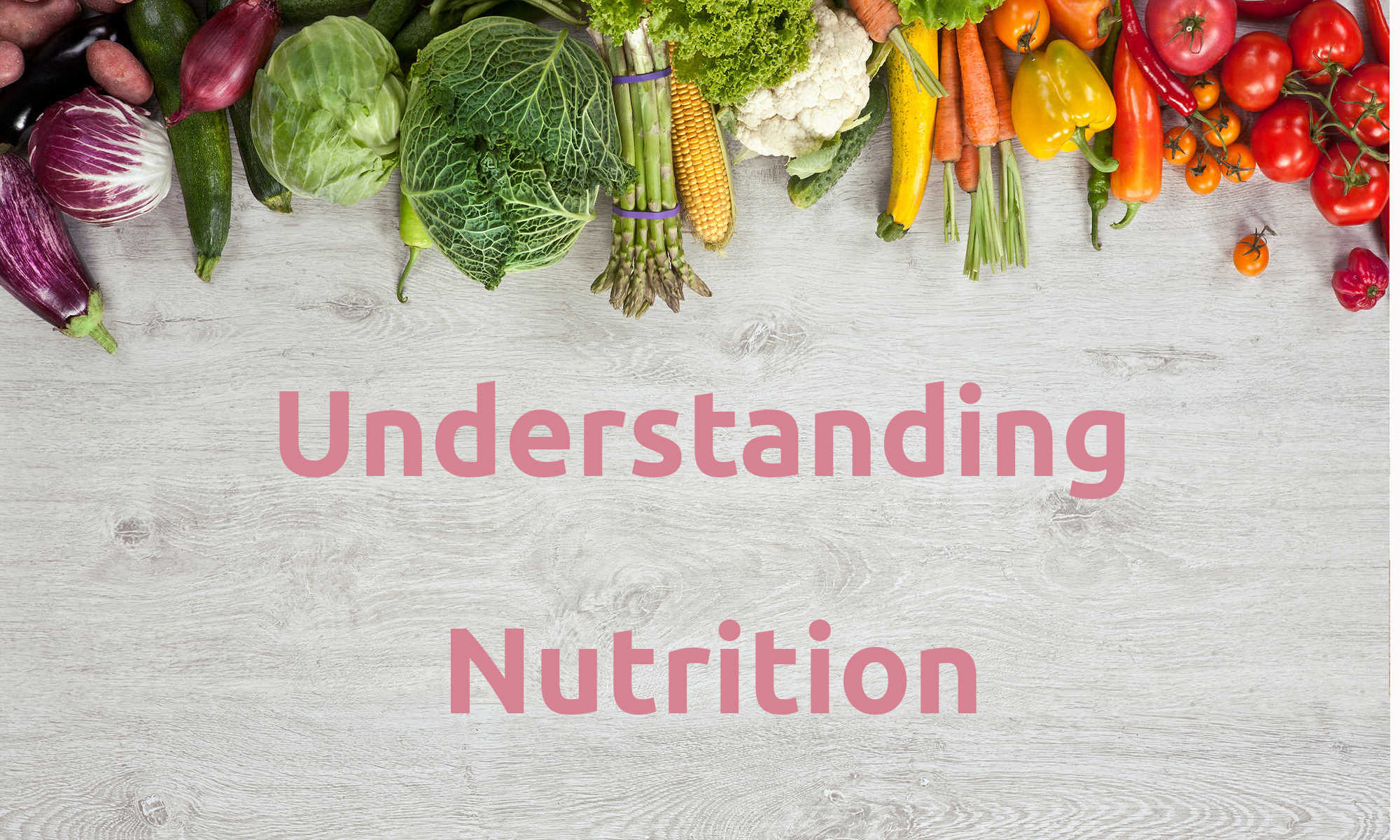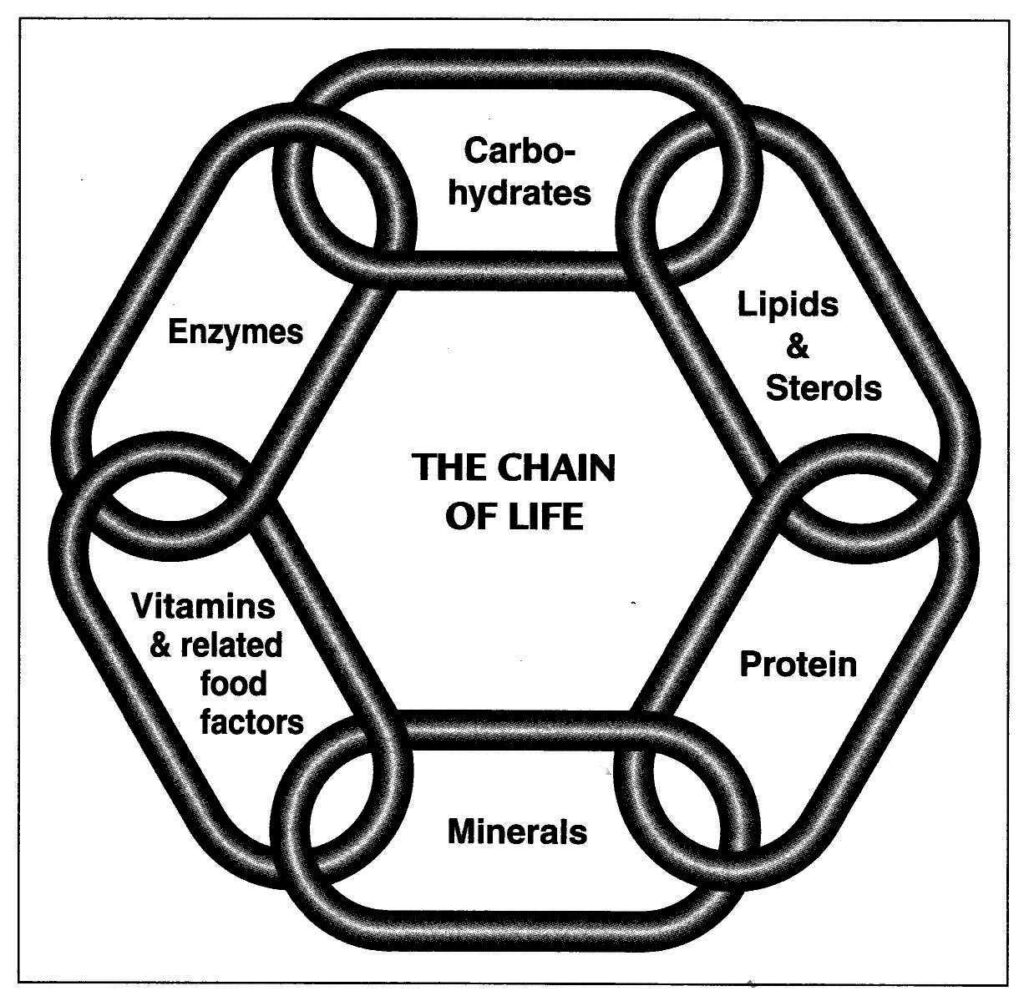
In Part 1 we looked at how diet and nutrition differ and how nutrients can only benefit us when they are assimilated into the cells. In Part 2 we learned why the the nutritional content of our foods has declined and how modern medications often aggravate the problem. Now we’ll look at the different types of nutrients there are, their relationships and how they benefit us.
To get a better understanding of this, I’ve found it helpful to think in terms of what we have come to know as the Chain Of Life.

Here we see all the different types of nutrients depicted as links in a chain. We all know that a chain is only as strong as its weakest link. The same applies to our nutrition. Without a proper supply of all these nutrients our bodies cannot function. In addition, the effects of pollution, stress, poor diet, insufficient sleep, etc., all need to be combated and increase our need for these nutrients. If our diet is lacking in one or more of the links, or if the quality of those links is below par, our body’s ability to perform will be compromised. If this continues over a long period, the chances are that we will develop some form of chronic disease. For example, if we constantly eat a diet high in refined carbohydrates we will eventually get diabetes.
Let’s look at each of the links in more detail.
1. Carbohydrates
Carbs are the body’s primary fuel, they are the go-to source of energy. They are quickly, and easily, converted to energy in the body. There are basically two types of carbs, simple and complex.
- Simple carbs are quickly converted into sugars (glucose), easily absorbed into the bloodstream and then converted to energy in the cells. They are mainly refined carbs and make up the majority of the carbs we get in modern diets, because of the refining processes used by food manufacturers. Examples of refined carbs are sugar, white flour and white rice. They are the basis of most processed foods available today.
- Complex carbs require lengthier processing by the digestive system, take longer to reach the cells and provide sustained energy, as opposed to the instant energy we get from the simple carbs. Examples of complex carbs are wholegrains e.g. wholewheat bread and brown rice and starchy vegetables like sweet potatoes, butternut, carrots, etc. We need to reduce the amount of simple carbs in our diets and increase the amount of complex ones. For more on how refined carbs affect us look at https://www.realhealth4life.co.za/blood-sugar-levels/
2. Lipid and Sterols
Lipids and sterols are healthy fats. They are termed ‘essential’ fats because our bodies cannot make them, we have to get them from our diet. Unfortunately, fats go rancid easily, so food processors remove them to provide longer shelf life for their products. For example, you can buy any wheat derived product such as flour, bread, pasta, couscous, etc., and there will be no wheat germ oil in it. Bad fats, such as trans-fats and saturated fats predominate in our modern diets. Lipids and sterols play a vital role in the assimilation of nutrients into the cells. For more on how they function read Part 1. It’s very difficult these days to get adequate amounts of lipids and sterols from our diet, so supplementation is a good option.
3. Protein
Every part of our body is made of protein, from hair to muscles to bones. It accounts for ±75% of our mass. It is also required for just about every essential function in our bodies, e.g. haemoglobin is a protein in the blood that transports oxygen and insulin is a protein that regulates blood sugar. It’s involved in muscle action and the functioning of our immune system. Unfortunately, the most common sources in our diets today are no longer good quality proteins. Meats and dairy products are full of growth hormones and antibiotics that are fed to the animals to maximise profits. Processed meats, cheeses, etc., also contain preservatives like nitrates and nitrites that are carcinogenic. Look for organic, free range meats, eggs and dairy products and increase the amount of vegetable protein (legumes and whole grains) you consume.
4. Minerals
Minerals are critical to the the functioning of the body and they make up 4-5% of our weight. They are classed as macro minerals, such as calcium, magnesium, potassium and micro (or trace) minerals such as selenium, chromium and molybdenum. Minerals are crucial to muscle response, nervous system communication, digestion, metabolism and the production of hormones and antibodies. They play a role in regulating water and acid levels and have many other functions. Zinc for instance, is involved in numerous aspects of cellular metabolism. It is required for the function of approximately 100 enzymes and it plays a role in immune function, protein synthesis, wound healing, DNA synthesis, cell division and much more. Zinc, like many other minerals, can’t be stored in the body so we need a daily supply from our diet. With modern farming methods, like mono-cropping, and the use of synthetic fertilizers, many of the minerals in the ground have been depleted. This means we often don’t get adequate amounts from our diet, making supplementation something to consider.
5. Vitamins and related food factors
Vitamins, in most cases, cannot be made in our bodies, so we have to get them from our foods. They are essential for every function in our bodies. Vitamins are classed as water soluble (Vits B & C) which cannot be stored in the body, and fat soluble (Vits A, D, E and K)which can be stored. Like minerals, they are essential for all bodily functions and deficiencies can lead to disease over time. It has become very difficult to get adequate amounts from our diet. Freezing, storing and cooking all damage vitamins, so supplementation is important.
In addition to vitamins we also need various phytonutrients (nutrients from plants) which help protect our cells. There are three main categories – carotenoids (fat soluble), flavonoids (water soluble) and cruciferous compounds. We need to get all of these from our diet.
6. Enzymes
Enzymes help the body to perform chemical reactions which would usually require higher temperatures than our normal body temperature. Without them the chemical reactions in our cells would be so slow that we would be unable to live. Enzymes are vital for digestion and metabolism, they assist in breaking down foods so that the basic nutrients can be assimilated into the cells. They are fragile and can be affected by heat, pH and other factors in the body. A deficiency of any enzyme can lead to disease. The body makes enzymes from amino acids (the building blocks of protein), vitamins and phytonutrients, so a deficiency of any of these will affect our heath long term.
We can now see that all the links of the chain need to be complete and functioning well for us to be healthy. It is also clear that we need to eat a diet that contains elements from each of the links. Modern farming methods and food processing have made it very difficult to get adequate amounts of nutrients from our foods. There will always be a gap between what we are actually getting and what we require, so supplementation has become essential to maintain good health. When choosing supplements look for ones that are derived from whole food, organic sources, have proper scientific studies backing them and are manufactured in accordance with Good Manufacturing Practices.
For more info go to the Health News page